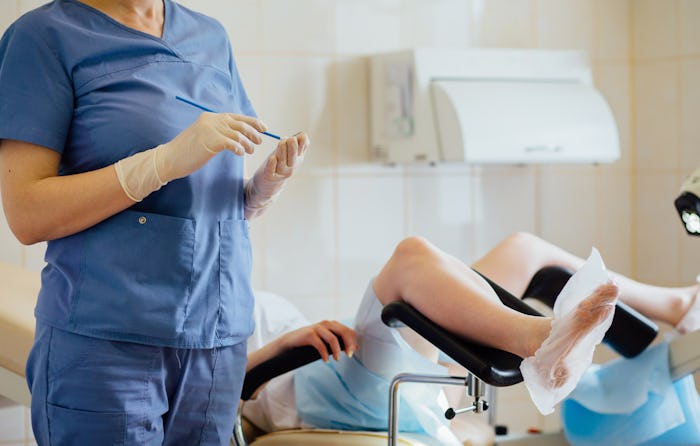Life

Here's Why A Pap Smear Is Important When You're Pregnant, According To Experts
Any woman who's been to the gynecologist knows how invasive some of the procedures can feel. Still, breast exams and pap smears are life-savers and extremely necessary for the overall health of any woman. Pregnancy changes a lot of things, though, so it's normal to ask the question, "Can you get pap smears when you're pregnant?" to anyone who will listen. If you think in terms of staying on top of your health and wellness, and being proactive should any complications arise, the answer is kind of an easy one.
The American Pregnancy Association (APA) describes a pap smear as "a test used to look for changes in the cells of the cervix which indicate cervical cancer or conditions that may develop into cancer." The most important thing a pap smear can do, according to the APA, is detect abnormal cells which may give your doctor cause to investigate further. The association goes on to add that a pap smear during pregnancy is completely normal. In fact, it's a routine procedure administered to prevent and/or provide early detection for any pre-natal conditions that run the risk of causing significant pregnancy complications.
So when do your pap smears occur while pregnant? The Bump says it'll likely happen during your first prenatal visit. It's important to know if you're at risk for cervical cancer and sexually transmitted diseases (STDs) — things that can complicate pregnancy and may lead to lifelong effects for you or your baby.
If you're wondering how different a pregnancy pap smear might be, rest assured, it's not. Parents states it's the same protocol as any other pap smear you've probably had in the past, where your doctor collects cells from your cervix with a small instrument, as well as a cotton swab swipe for the STD-testing portion of the event. Typically, results are given within a week or two.
In the event there's a cause for concern regarding any abnormal cells, and your doctor orders additional testing to confirm, the diagnosis will determine when and how treatment will occur. For cancerous cells, treatment may be delayed until after delivery, though STDs usually need to be taken care of as soon as possible to prevent potential complications or future problems for your baby at the time of their birth.
While you can, and should, have pap smears while pregnant, there's nothing different or special about them. Not only are they important in the prevention of cancer, but can detect an STD you may not realize you've had. Likewise, the APA says pap smears also reveal a yeast infection, which is common in pregnancy due to hormonal changes (and other possible reasons, such as intercourse or high blood pressure).
Having pap smears may not be the most comfortable thing — especially during pregnancy — but it's necessary and completely safe.